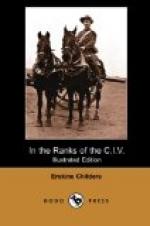“We are back at camp about 1.30, form our lines again, between the guns and waggons, unharness, rub down horses, and then have dinner. There is fresh beef generally (that unlovely soldiers’ stew), and either rice, duff, or, now and then, stewed quinces, which are very common in the country. We can buy beer at a canteen, or, better still, draught ginger-beer, which is a grand drink. At three ‘stables’ sounds, with grooming first, and then (I am choosing a full day) harness cleaning; that is to say, soaping all leather-work, and scouring steel-work. Harness-cleaning is irksome work, and, as far as appearances go, is a heart-breaking task, for the eternal dust is always obliterating every trace of one’s labour. I have none of my own to look after yet, but help the others.
“At 4.30 or five ‘Prepare for water’ sounds. You put a bridoon on one horse, and, if you are luxurious, a blanket and surcingle to sit on, lead the other, and form up in a line; then ‘file right’ is the order, and you march off to the watering place, wearing any sort of costume you please. And very slight and neglige some of them are. In the cool of the evening, this is a very pleasant three quarters of an hour. After watering comes the evening feed, followed by tea at six o’clock, and then the day’s work is done.”
The evenings in that climate are delicious; we could sit in our shirt-sleeves until any hour, without any perceptible chill in the air, playing cards, or smoking and talking, or reading by a lantern. Williams and I found picket a great resource; and many a good game of whist have I had sitting in a crowded quartette in our ramshackle battery Cape-cart, with an inch of candle guttering among the cards.
Most of us slept in the tents, but I preferred the open, even in dust-storms, when choosing a site required some skill. The composition of a bed was a question of sacks. There was one very large variety of chaff-sack, which was a sleeping-bag in itself; with this and your blanket and cloak, and under the lee of some forage or scrub, you could defy anything. The only peril was that of a loose horse walking on you.
On some afternoons we were quite free till the stable-hour at four. Till then we could bask in camp, or go for a bathe in the river, where there was one splendid deep-water pool, whence you could hear the baboons barking on the hill-sides, and see the supply trains for the front grinding heavily up the pass.
Rumours of a move never lost their charm. At first we used to take them seriously, but gradually the sense of permanence began to pervade our camp. Solid tin shelters rose for the guard and the sergeants; a substantial tin canteen was erected close to the lines by cynical provision-dealers. Those visionary rebels declined to show themselves; nobody attacked our precious pass; and, in short, we had to concentrate our minds upon the narrow circle of our daily life.




